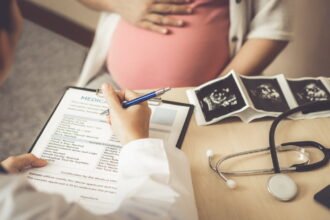Your bundle of joy has arrived, but your body hasn’t stopped going through changes. What can you expect in the coming months?
While many articles focus on what to expect during pregnancy, fewer warn you about postpartum changes. Here are eight things that happen to your body after birth — not all of them are pretty, but forewarned is forearmed.
1. Your Bathroom Habits Change
During pregnancy, you may have run to the bathroom — a lot. However, upon giving birth, you might find urination a challenge. Anywhere from 1.5% to 14% of women experience postpartum urinary retention, a condition that makes it impossible to void your bladder. While rare, the situation often requires temporary catheterization to remedy.
Another issue you may encounter is hemorrhoids. This condition occurs when the vein clusters around the anus become inflamed and swollen. You run a higher risk if you opted for vaginal delivery and had to push and strain.
2. You Shed Weight
Surprise — not all changes that happen to your body after birth make you feel insecure. Many women shed about 13 pounds during childbirth, and the weight often keeps flying off if you choose to breastfeed. You’ll drop sizes rapidly in the days immediately after giving birth as the accumulated fluids in your body void.
When you breastfeed, your body burns more calories producing milk. Fortunately, there is one silver lining to the 2020 novel coronavirus pandemic. If you now telecommute, you no longer have to fuss with cumbersome breast pumps at the office.
3. You Get Top-Heavy
Once you give birth, your body starts producing milk soon afterward. In many women, breast size increases during pregnancy, so you may or may not need to invest in new bras. However, once your baby starts eating solid foods, they’ll begin to deflate — some women return to a smaller size than they had before they were pregnant.
Weaning your infant gradually can reduce the pain that comes when you stop breastfeeding. You can expect to feel achy for five to ten days after the cessation. Sore lumps can indicate the beginnings of mastitis, which occurs when a duct gets blocked — try gently massaging the region to express the milk.
4. Your Periods Restart — Gradually
While your maternity pants might be the only pair you have free from stains, Aunt Flo will reappear after you give birth. How soon she flies into town depends on whether or not you breastfeed.
If you choose to go the formula route, you may see your period reappear in three to ten weeks after childbirth. However, if you breastfeed, you may enjoy many more weeks of bleed-free bliss, especially if you do so exclusively.
5. You Shed
While you were expecting, you might have marveled at your lustrous locks. However, once you give birth, you start to lose that glorious mane. You seemingly gain more while pregnant because the increased blood flow prevents your hair from falling out as frequently as normal.
However, the thought that you would have lost all those hairs, anyway, matters little when you see scary clumps in the sink. To minimize the effect, please skip the crash diets, eat a healthy menu and continue taking your vitamins. Giving birth is arduous, and your body needs the extra nutrients to recover.
6. You Could Break Out
If you enjoyed clearer skin while expecting, please brace yourself. Fluctuating hormonal levels might cause you to break out worse than usual once you give birth. While this condition often clears up with no treatment, you can take action to minimize it. However, you must take precautions while breastfeeding.
If you choose to breastfeed, please avoid products containing retinoids. These substances can pass through the milk to your infant. Stick with over-the-counter remedies containing benzoyl peroxide or salicylic acid that doesn’t pose the same risk.
7. Your Center of Gravity Shifts
While you were pregnant, you walked around with the equivalent of a lightweight bowling ball strapped to your belly. While you’ll regain your equilibrium after giving birth, you might find that you are a little wobbly the first time you return to your Ashtanga class.
While childbirth doesn’t change your bones, think about the way your hips expand to allow the baby to pass through your birth canal. All those connective tissues take a while to stretch, and when they return, much like a rubber band, they don’t always snap back to their original size. As a bonus, though, you might find that you’re more flexible now than ever — celebrate!
8. You Could Develop Stretch Marks
Stretch marks are scars, and as the song says, they remind you that your past is real. However, many women prefer to pass on showing off their motherhood status when they rock a bikini. How can you minimize their appearance?
Creams can help, especially those containing cocoa butter, but you have to start rubbing them early — they have little noticeable effect on mature marks. Tretinoin — also known as Retin-A — or hyaluronic acid can minimize stretch lines the way they do wrinkles. If you can’t stand the sight of your birth reminders, you can seek plastic surgery via microdermabrasion, laser therapy or chemical peels.
Prepare for These 8 Things That Happen to Your Body After Birth
Pregnancy changes your body, and the alterations don’t stop when you give birth. Now that you know to prepare for these eight things that happen to your body, you can minimize unwanted effects.










